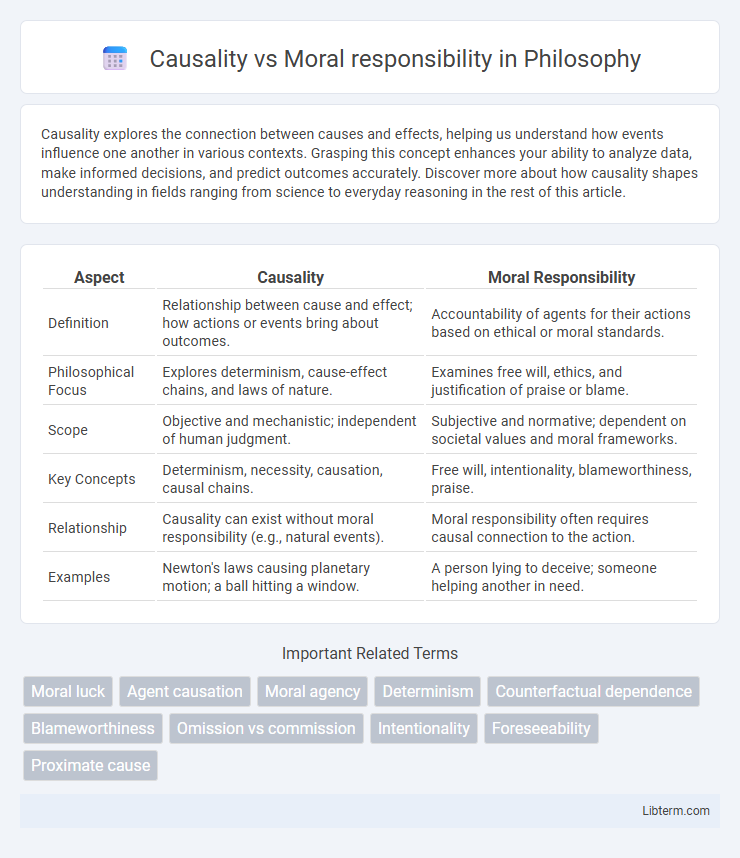Causality explores the connection between causes and effects, helping us understand how events influence one another in various contexts. Grasping this concept enhances your ability to analyze data, make informed decisions, and predict outcomes accurately. Discover more about how causality shapes understanding in fields ranging from science to everyday reasoning in the rest of this article.
Table of Comparison
| Aspect | Causality | Moral Responsibility |
|---|---|---|
| Definition | Relationship between cause and effect; how actions or events bring about outcomes. | Accountability of agents for their actions based on ethical or moral standards. |
| Philosophical Focus | Explores determinism, cause-effect chains, and laws of nature. | Examines free will, ethics, and justification of praise or blame. |
| Scope | Objective and mechanistic; independent of human judgment. | Subjective and normative; dependent on societal values and moral frameworks. |
| Key Concepts | Determinism, necessity, causation, causal chains. | Free will, intentionality, blameworthiness, praise. |
| Relationship | Causality can exist without moral responsibility (e.g., natural events). | Moral responsibility often requires causal connection to the action. |
| Examples | Newton's laws causing planetary motion; a ball hitting a window. | A person lying to deceive; someone helping another in need. |
Defining Causality: What Does It Mean to Cause an Event?
Causality refers to the relationship between cause and effect, where one event or action directly brings about another event. It involves identifying the conditions or factors that are necessary and sufficient to produce a specific outcome, emphasizing temporal precedence and consistent correlation. Understanding causality requires distinguishing between mere correlation and true causation, often explored through counterfactual reasoning and causal mechanisms.
Understanding Moral Responsibility: Principles and Foundations
Moral responsibility is grounded in the principles of agency, intent, and the capacity to make ethical decisions, distinguishing it from mere causality which only establishes a cause-effect relationship. Understanding moral responsibility involves analyzing the agent's control over actions, awareness of consequences, and adherence to social and ethical norms. These foundations highlight that responsibility requires more than causation; it demands intentionality and moral reasoning.
The Relationship Between Causality and Responsibility
Causality establishes the connection between actions and outcomes, serving as the basis for attributing moral responsibility. Moral responsibility depends on agents' intentional control over causal chains leading to consequences, differentiating mere cause from accountable action. Understanding this relationship clarifies how ethical judgments assign praise or blame in contexts like legal liability and moral philosophy.
Causal Chains: Tracing Actions to Outcomes
Causal chains involve tracing a sequence of events or actions that lead to specific outcomes, highlighting the direct links between causes and effects. In the context of moral responsibility, understanding these chains helps determine the extent to which an individual's actions contributed to an outcome. This analysis is essential for assigning accountability, distinguishing between mere causation and deliberate intent in ethical evaluations.
Moral Agency: Who Can Be Held Responsible?
Moral agency centers on the capacity of individuals or entities to make informed, intentional decisions that can be evaluated ethically, distinguishing them from mere causal agents who only contribute to outcomes without moral intent. Human beings are typically considered moral agents due to their ability to understand and reflect upon ethical principles, whereas non-human entities like animals or machines generally lack this capacity despite causing effects. The core question in moral responsibility lies in assessing who possesses the awareness and free will to be held accountable for their actions within social and legal frameworks.
The Role of Intent in Assigning Responsibility
Intent plays a crucial role in assigning moral responsibility, distinguishing mere causality from ethical accountability. While causality addresses whether an action directly led to an outcome, moral responsibility requires examining the agent's intent and awareness during the act. Legal systems and ethical theories both emphasize intentionality to determine culpability and justify praise or blame.
Distinguishing Accident from Blame: When Causality Isn’t Enough
Distinguishing accident from blame requires more than establishing causality, as moral responsibility involves intent, knowledge, and foreseeability beyond mere cause-and-effect relationships. Legal and ethical frameworks emphasize the agent's mental state, such as negligence or recklessness, to assign blame, differentiating unintentional accidents from culpable actions. Causality alone cannot address the moral dimensions of responsibility, which depend on normative judgments about the agent's control and duty.
Collective Responsibility and Shared Causality
Collective responsibility emerges when multiple individuals or groups contribute to an outcome, making it difficult to isolate single agents' moral accountability within shared causality frameworks. In contexts where shared causality prevails, moral responsibility is diffused across participants, challenging traditional notions that assign blame exclusively to individual actors. Understanding the interplay between shared causality and collective responsibility is essential for addressing ethical dilemmas in social, legal, and organizational systems.
Legal Perspectives: Causality and Accountability in Law
Legal perspectives on causality and moral responsibility emphasize establishing clear links between actions and outcomes to assign accountability effectively. Courts apply the "but for" test and proximate cause principles to determine whether a defendant's conduct directly led to harm, shaping judgments of liability. Understanding causality in law ensures just attribution of responsibility, balancing factual cause with ethical and legal standards.
Philosophical Debates: Bridging the Gap Between Cause and Morality
Philosophical debates on causality versus moral responsibility center on distinguishing factual cause from ethical accountability, emphasizing how actions lead to consequences without necessarily assigning blame. These discussions explore the extent to which causal relationships underpin moral judgments, examining theories such as compatibilism and libertarianism that reconcile determinism with free will. Bridging the gap requires analyzing the interplay between objective causal chains and subjective moral evaluations to understand how individuals can be held responsible within complex causal frameworks.
Causality Infographic

 libterm.com
libterm.com